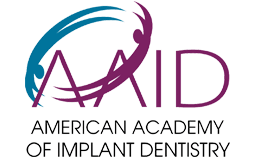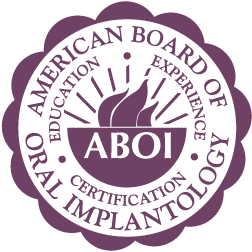The Perfect Solution for Multiple Missing Teeth
While not as common as patients who are missing only a single tooth, we do receive patients here at our Harford County, MD practice that are suffering from multiple missing teeth. Many of these patients end up restoring every one of their missing teeth with individual implants and crowns. However, some patients find that treating their missing teeth this way ends up costing too much, or their oral health is not strong enough to support that many implants. Fortunately, these patients are still able to move forward with tooth restoration treatment using dental implants. Instead of individual restorations for each and every tooth, these patients choose to move forward with implant supported dentures. We encourage you to read on to learn more about this treatment.
What Are Implant-Supported Overdentures?
The implant supported overdenture is a partial or full denture that is attached to a set of implant fixtures. While a regular denture merely sits on top of your gums, your overdenture will connect to your implant fixtures, allowing it to work and feel closer to a natural set of teeth. For this particular process, four to six implant fixtures are placed in your jawbone. They will heal just like natural implants, fusing to your jawbone over time. Once healed, an abutment is attached to each fixture and the overdenture connected, giving you both the full restoration possible with dentures and the stability and support possible only with dental implants.
Types of Overdentures
There are two main types of restoration that are available using an overdenture. These are:
- Bar-retained Dentures: For this type of overdenture, a metal bar is attached to the implant fixtures placed in your jawbone. At this point, connector pieces are attached to either the bar or the overdenture, which will be used to attach the bar to the denture, holding it securely in place.
- Ball-retained Dentures: This type of overdenture restoration is closer to the standard dental implant restoration, which uses an abutment to attach a porcelain crown to the implant fixture. For this treatment, abutments that take the form of small, ball shaped studs are attached to the implant fixtures. These small balls will then attach sockets built into the overdenture, holding the piece securely in place.
What Are the Benefits of Overdentures?
With overdentures, you can enjoy a complete smile with just a few dental implants. There are many benefits to overdentures, including:
- Health– Helps prevent jawbone deterioration
- Increased function– Eat and speak with ease
- Comfort– With added stability comes increased comfort
- Easy maintenance– Clean overdentures just like natural teeth
- Reliability– Trusted method for replacing multiple teeth
- Support– Replace multiple teeth with just a few dental implants
The Implant-Supported Overdentures Process
Implant-supported overdentures come with many benefits that make them far superior to their implant-less alternative. For instance, because your overdenture is securely connected to your implants, you will not need to worry about your treatment getting loose or moving out of place. This will make it so that you can speak clearly and chew naturally with your overdenture, making the treatment feel reliable and comfortable.
Your overdenture will also require much less maintenance than what you would expect with a standard denture. You will only need to brush and floss your overdenture normally, just like you would with your natural teeth. This is a big difference from standard dentures, which have to be removed daily and soaked in a cleaning solution.
How Do I Care for My Overdentures?
Just like your natural teeth, bacteria and plaque buildup on your overdenture throughout the day, making a proper daily cleaning a necessity. In addition to any recommendations given by Dr. Grubb, you’ll want to incorporate a few steps into your nightly routine to ensure your overdentures stay in optimal condition including:
- Removeyour overdenture and clean it using a soft-bristled toothbrush and a mild detergent. Gently brush all areas of the overdenture and follow up with a thorough rinse.
- After cleaning, place the overdenture in a glass of plain water and soak it overnight.
- Avoidusing bleach or other harsh chemicals when cleaning your overdenture.
It’s also important to thoroughly clean your mouth and around your overdenture attachments to keep the surrounding gums healthy and free of infection. To keep your mouth healthy, we recommend:
- Brusharound the abutments with a soft-bristled toothbrush. Small toothbrushes, such as child-sized, or interdental brushes are especially helpful for cleaning food particles from around the abutments. Also, brush your gums, tongue, and roof of the mouth to keep your entire mouth healthy and breath fresh.
- Rinsewith mouthwash twice a day to remove debris and germs.
- Visitus for regular checkups, so we can make sure your gums and bones remain healthy and your overdenture fits properly.
Am I a Candidate for Overdentures?
Are you ready to start your journey to a new smile? Overdentures will help you maintain a healthy jawbone, allow you to eat and speak clearly, and restore your confidence to smile. Candidates for overdentures have sufficient jawbone density and are in good overall oral health.
The best way to know if you’re a good candidate for overdentures is to schedule a consultation with Dr. Grubb. During the consultation, he’ll educate you on the details of the procedure and determine if you’re an ideal candidate.
Frequently Asked Questions
Do implant-supported overdentures hurt?
As long as an experienced dentist such as Dr. Grubb is conducting your procedure, getting implant-supported overdentures is virtually painless. Before the beginning of your treatment, our staff will apply a local anesthetic to numb your mouth completely. After your dentures are placed, you may feel some discomfort, which can be managed using over-the-counter painkillers and cold compresses.
How do I take care of my implant-supported overdentures?
Caring for your overdentures is as easy as maintaining your natural teeth. As long as you practice a good oral hygiene regimen, which includes brushing at least twice a day and flossing daily, your fixtures can last for a long time. It’s also important to schedule biannual appointments with Dr. Grubb at our Havre de Grace office so he can monitor your overdentures.
How long does it take to receive implant-supported overdentures?
The process of receiving implant-supported overdentures can be completed in a couple of appointments. After your dental implants are attached to your jawbone, it will take a while for them to fuse completely. Afterwards, we’ll install your overdentures to the implants during your next appointment, giving you a smile that’s camera-ready.
Does insurance cover implant-supported dentures?
Most insurance companies will only cover a portion of implant-supported overdentures. Our staff recommends contacting your provider to get a better understanding of your coverage. At Family Implant & Reconstructive Dentistry, Dr. Grubb is always available to answer any questions you may have.
Complete Your Smile With Overdentures
If you are missing all or most of your natural teeth on one or both arches, or if you already wear removable dentures, overdentures may be a good choice for you. We encourage you to discover your treatment options by scheduling a consultation with Dr. Grubb. During the consultation, he’ll examine your oral health and discuss your smile goals to help you determine if overdentures are right for you.
If you struggle with eating, speaking, or feeling confident enough to smile, don’t wait any longer. Use our convenient online form to contact our practice in Havre de Grace or give us a call at (410) 939-5800 and let us know how we can help you with your smile.




